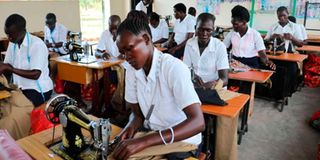Urban refugee girls, women to benefit from e-learning initiative

Women at a refugee camp undergoing a tailoring course. Three organisations - RefuSHE, Kytabu and Wazi have partnered to create a tailored curriculum for urban female refugee aged 17 to 40 years.
What you need to know:
- Urban refugee girls in Kenya are set to benefit from an e-learning and tele-counselling initiative.
- RefuSHE, has partnered with an education technology company, Kytabu, and a digital mental health service provider, Wazi, to create a curriculum for the refugee girls and women aged 17-40.
Urban refugee girls in Kenya are set to benefit from an e-learning and tele-counselling initiative thanks to a conglomerate of community development organisations.
RefuSHE, an organisation protecting the rights of refugee women and girls in East Africa has partnered with an education technology company, Kytabu, and a digital mental health service provider, Wazi, to create a tailored curriculum and mental health package for the refugee girls and women aged 17-40.
By availing the information on the digital platforms which could include mobile applications, the refugee women and girls will overcome challenges to accessing literacy and numeracy skills. Often, they are locked out of formal learning institutions due to lack of identification documents.
RefuSHE Digital Literacy and Education Innovation, senior director, Ms Rose Muthuri said the beneficiaries will be equipped with vocational and entrepreneurship skills among others.
They will also gain access to counsellors to offer them psychosocial support.
“Access to information will not be limited to the refugee girls and women in Nairobi and the peri-urban areas. It will be available to all refugee women and girls across the country,” she told the nation.africa on Friday.
Build resilience
With Mastercard Foundation’ financial support, the partners are currently packaging the information as informed by the needs assessment conducted on the targeted group.
Mastercard Foundation, Eastern and Southern Africa, regional head, Mr Daniel Hailu exemplified the project as one strategy that can build resilience of communities against economic shocks.
“Digital technology can enable economic recovery and build the resilience of vulnerable communities,” he said in a March 25, joint statement.
“Enabling a large-scale economic rebound requires an integrated and inclusive approach that reaches all MSMEs (Micro, Small and Medium Enterprises),” he added.
Kytabu, founder, Mr Tonee Ndungu said the initiative will bridge the information gap among the refugee women and girls.
“For the longest time, vulnerable communities like refugees and internally displaced persons (IDPs) have been ignored by mainstream education technology solutions…(yet) more than 16 per cent of people in the world are either refugees or IDPs,” he said in the statement.
Wazi, chief executive officer, Mr Alex Royea said the tailored curriculum and mental health package will be informed by the best practices in mental health, education, and refugee support.





